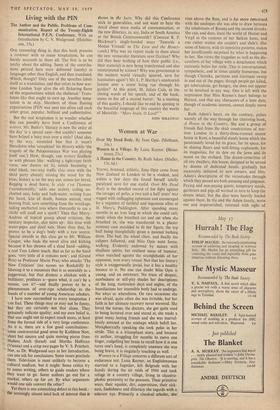Living with the PEN
The Author and the Public. Problems of Com- munication. Report of the Twenty-Eighth International P.E.N. Conference. With an Introduction by C. V. Wedgwood. (Hutchin- son, 15s.) ONE reassuring thing is, that this book presents a reviewer with so many temptations, he can barely succumb to them all. The first is to be tetchy about the editing. Some of the contribu- tions printed here were delivered (surely) in languages other than English, and then translated. Which, though? Only one of the speeches labels itself as a translation, and that refers to how war- time London 'kept alive the oft flickering flame of the organisations which she sheltered.' Trans- lators like that ought to own up. Another temp- tation is to skip. Members of these flaming organisations (PEN was one) too often call each other great, popular, brilliant and authoritative.
But the real temptation is to wonder whether this can possibly have been a Conference of writers. Mr. Butler's 'literacy is now the order of the day' is a special case—but couldn't someone have helped a busy man over a style? (And also, by the way, reminded him that it wasn't Herodotus who `completed' his History while 'the tragedy of the Peloponnesian War was playing itself out.') How, though, can writers fusillade us with phrases like : walking a tight-rope (with verse, one dances on it), minds becoming a total blank, two-way traffic (his: once with the third party absent), missing the wood for the trees, history is on the way out, stones for bread, flogging a dead horse, lc style c'est l'homme (`unredeemably,' adds one zealot), sailing un- charted seas, baby and bath-water, writing from the heart, kiss of death, human animal, seed bearing fruit, save something from the wreckage, sailing uncharted seas where (forsooth) to use a clichd will snuff out a spark? Then that Merry- Andrew of topical gossip about criticism, the sanitary inspector, also turns up : this time with water-pipes and dead rats. More than that, he proves to be a dog's body with a raw source. Special awards in this class go to Mr. William Cooper, who finds the novel alive and kicking because it has thrown off a dead hand—adding, a real Tom Lehrer touch; that as far as the hand goes, 'very little of it remains now'; and (Grand Prix) to Professor Mario Praz; who attacks The New Criticism' (no names no Rockdrill) by likening it to a mountain that is as unwieldy as a juggernaut, but that dissects a chicken with a bulldozer, produces a—guess what, it can't be a mouse, can it?—and finally proves to be a phenomenon of over-ripe • scholarship in the hands of a number of young American scholars.
I have now succumbed to every temptation I can find. These things may or may not be funny, but they are certainly not that alone. They genuinely indicate quality; and my own belief is, that one ought not to expect much more, at least from the formal side of a very large conference. As it is, there are a few good contributions : some controversial good sense by Kathleen Nott, short but sincere and quite moving pieces from Sholem Asch (Israel) and Martha Hoffman (Vienna) and a crisp two pages by V. S. Pritchett.
'Zr Nor, as Dr. Wedgwood says in her Introduction, can one ask for conclusions. Some issues preclude them. Television is most unlikely to become a cultural medium, but it might. Some critics try to assess writing, others to guide readers where they want to go. Some authors go out for a market, others up for art. By what arguments would one side convert the other?
Yet there is one astonishing defect in this book : the seemingly almost total lack of interest that it
shows in the facts. Why did this Conference stick to generalities, and not want to hear the detail about mass media of communication, or the new illiteracy, in, say, India or South America or the British Commonwealth? (Contrast R. P. Blackmur's single-handed essay 'Towards a Modus Vivendi' in The Lion and the Honey- comb.) Why was no report made to them about the new vernacular literature save Occitan? Why did they hear nothing of how their public (i.e., their material) is now being transformed and also reinterpreted by science? Why was government in the modern world virtually ignored, save for (sanitation again!) Mr. L. P. Hartley's amateurish lament over a sewer being run through his garden? At this point, M. Julien Cain, in the closing words of his speech, and of the book, seems to fire off a second barrel : `In a meeting of this quality, I should like to end by quoting in the beautiful language of this country the words of Meredith : "More brain, 0 Lord!" '
JOHN HOLLOWAY


































 Previous page
Previous page